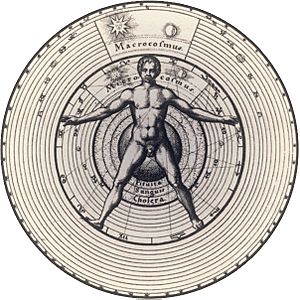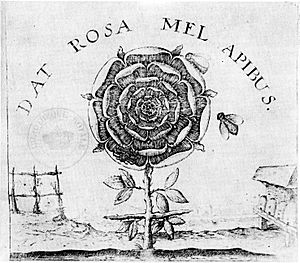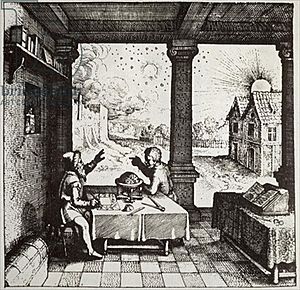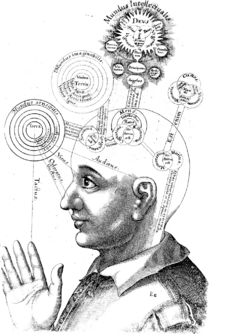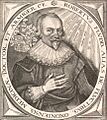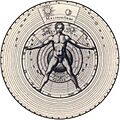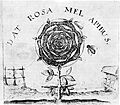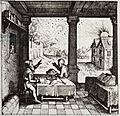Robert Fludd facts for kids
Quick facts for kids
Robert Fludd
|
|
|---|---|
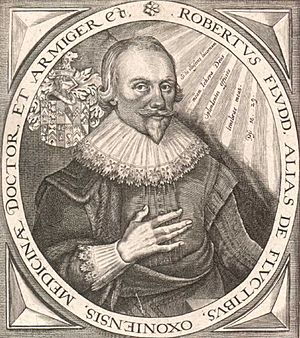 |
|
| Born | 17 January 1574 Milgate House, Bearsted, Kent
|
| Died | 8 September 1637 (aged 63) |
| Nationality | English |
| Occupation | Physician, astrologer |
Robert Fludd (born January 17, 1574 – died September 8, 1637) was an important English doctor. He was interested in both science and mystical ideas. People knew him as an astrologer, mathematician, and someone who studied the universe. He also explored Kabbalah and Rosicrucian beliefs.
Fludd is famous for his writings on hidden knowledge and ancient wisdom. He had a well-known debate with the famous astronomer Johannes Kepler. They disagreed about how to gain knowledge, whether through science or through mystical traditions.
Contents
Early Life and Education
Robert Fludd was born at Milgate House in Bearsted, Kent. His father, Sir Thomas Fludd, was a high-ranking government official. He worked for Queen Elizabeth I as her treasurer for war in Europe. His mother was Elizabeth Andrews Fludd.
Fludd started studying at St John's College, Oxford in 1591. He earned his first degree in 1597 and a master's degree in 1598. This college was one of the few in England that offered medical studies. This likely sparked Fludd's interest in becoming a doctor.
Becoming a Doctor
After finishing his studies at Oxford, Fludd traveled around Europe. Between 1598 and 1604, he studied medicine, chemistry, and hermeticism (a type of ancient wisdom). He spent a winter in the Pyrenees mountains. There, he studied theurgy, which is the practice of rituals to connect with divine powers. He also visited Spain, Italy, and Germany.
When he returned to England in 1604, Fludd went back to Oxford. He wanted to get his medical degree. To do this, he had to show he understood important medical texts. These were mainly by ancient doctors like Galen and Hippocrates. Fludd passed his exams and became a doctor in 1605.
After graduating, Fludd moved to London. He tried many times to join the London College of Physicians. This was a group that controlled who could practice medicine in London. Fludd had trouble because he didn't always agree with traditional medical ideas. He preferred the views of Paracelsus, a doctor who used chemistry and alchemy in medicine.
After several tries, he was finally accepted into the College in 1609. He became a successful doctor in London. He was even chosen four times to be a "Censor" for the College. This meant he helped check on other doctors and apothecaries (people who prepared medicines). He also helped write a book called Pharmacopoeia Londinensis in 1618. This book listed standard medicines.
Fludd was one of the first people to publicly support William Harvey's theory. Harvey was another doctor who discovered how blood circulates in the body.
Mystical Interests
Even though Fludd was a doctor, he also believed in the wisdom of natural magicians. He thought that true knowledge came from studying numbers and ratios. He felt that these held hidden secrets, much like the ancient Greek philosopher Pythagoras. Fludd believed that understanding numbers could reveal religious truths. This idea later led to his disagreements with Johannes Kepler.
How Fludd Saw Nature
Fludd's writings often talked about how everything in nature was connected. He believed there was a special link between humans, the Earth, and God. He thought that all things came from three main parts:
- First, dark Chaos (like a void).
- Then, divine Light acting on the Chaos.
- Finally, the waters, which he called the Spirit of the Lord.
This "Spirit of the Lord" was the basic material for everything else. This three-part idea was important to Fludd. He saw it as a reflection of the Holy Trinity. He believed it showed how humans and Earth could connect with God.
The Universe and Humans
Fludd used his three-part theory to explain the relationship between the "Macrocosm" (the big universe) and the "Microcosm" (the small human body). He believed the divine light was the active force that created the world. He thought the Sun held the "Spirit of the Lord." Just as the Sun gives life to Earth with its rays, the human heart gives life to the body with blood.
Fludd believed that human blood carried the same "Spirit of the Lord" that the Sun gave to the Earth. He thought this spirit moved between the universe and the human body. This idea also shaped his view of disease. He thought that if this spirit movement was corrupted, it could bring illness into the body. Like Paracelsus, Fludd saw disease as something that invaded the body from outside.
Controversial Works
Many of Fludd's writings caused debates. He defended the Rosicrucians, argued with Johannes Kepler, and debated with French philosophers.
Defending the Rosicrucians
Fludd was not actually a member of the Rosicrucians, even though people often said he was. However, he strongly defended their ideas. The Rosicrucians were a mysterious group who published manifestos (public declarations) in the early 1600s. These papers talked about secret knowledge and a hidden brotherhood.
Fludd wrote books to defend the Rosicrucians against people who accused them of heresy (beliefs against religious teachings) or evil magic. He argued that their ideas were true and important.
- Apologia Compendiaria (1616)
- Tractatus Apologeticus (1617)
- Tractatus Theologo-philosophicus (1617)
Today, many historians believe that the "Brothers of the Rose Cross" (Rosicrucians) might not have been a real, organized group. Instead, their ideas might have been a popular intellectual trend. Scholars interested in alchemy, hidden knowledge, and mysticism might have used the idea of a secret society to make their views seem more important.
The Rosicrucian ideas became very popular between 1614 and 1620. Many pamphlets and books were published about them. Robert Fludd was a key figure in these discussions. Some people say he helped free the study of hidden knowledge from older ways of thinking.
Debates with Kepler
Johannes Kepler, a famous astronomer, did not agree with Fludd's ideas about the universe's harmony. Kepler wrote about his criticisms in his book Harmonice Mundi (1619).
Fludd replied to Kepler in his own books:
- Veritatis Proscenium (1621): Fludd argued that the mystical approach to knowledge was deeper than the mathematical one.
- Monochordon Mundi Symphoniacum (1622)
- Anatomiæ Amphitheatrum (1623)
Debates with Other Philosophers
Fludd also debated with other thinkers of his time. Marin Mersenne, a French philosopher, criticized Fludd's ideas in his book Quæstiones Celebres in Genesim (1623).
Fludd responded with:
- Sophiæ cum Moria Certamen (1629)
- Summum Bonum (1629): In this book, Fludd defended himself against accusations of practicing magic.
Another philosopher, Pierre Gassendi, also criticized Fludd's views. He disagreed with Fludd's mix of alchemy, cabbala, and Christian religion.
Cosmology and Other Works
Fludd's main philosophical ideas are in his large work, Utriusque Cosmi, Maioris scilicet et Minoris, metaphysica, physica, atque technica Historia. This means "The metaphysical, physical, and technical history of the two worlds, namely the greater and the lesser." It was published in Germany between 1617 and 1621.
In 1618, Fludd wrote De Musica Mundana (Mundane Music). This book explained his ideas about music, including his "divine" or "celestial" monochord. A monochord is a musical instrument with one string.
In 1630, Fludd designed several perpetual motion machines. These were machines that people hoped would run forever without stopping. Fludd's machine used a water wheel and an Archimedean screw to pump water back into its own tank. People were still trying to patent similar machines in the 1870s.
Some of his other important works include:
- Philosophia Sacra et vere Christiana (1626)
- Medicina Catholica (1629–1631)
After his death, some of his works were published:
- Philosophia Moysaica (1638)
- Religio Exculpata (1684)
Death
Robert Fludd died on September 8, 1637, in London. He was buried in Holy Cross Church, Bearsted.
Images for kids
-
The spiritual brain, derived from cruder versions in predecessors, such as Albertus Magnus and Gregor Reisch.
 | William M. Jackson |
 | Juan E. Gilbert |
 | Neil deGrasse Tyson |


